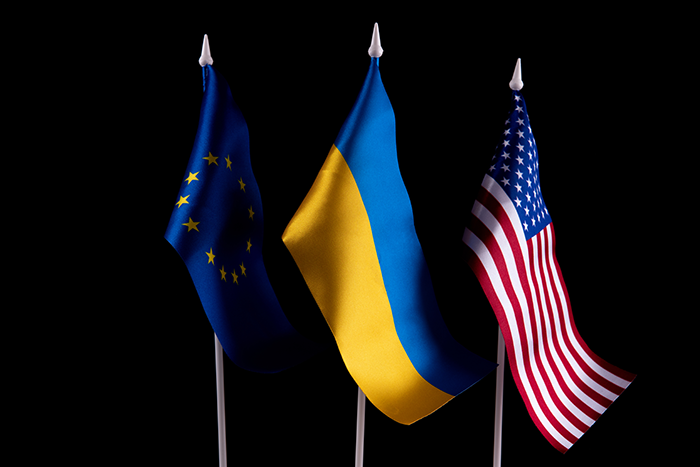Analyses / Europe, European Union, NATO
24 February 2025
In Ukraine, Trump Is Wrong, and So Are the Europeans

H-Hour has arrived. The Europeans have been caught up by History. They can no longer hide behind the United States, as the latter have made it clear that they intend to abandon them while they settle the Ukrainian crisis behind their backs with Vladimir Putin.
This is no surprise. European leaders should not be astonished. Donald Trump may have accelerated events—he has certainly made them worse—but his country’s withdrawal from the security affairs of the Old Continent was long announced and expected.
The diplomatic approach of the Trump administration to the war in Ukraine remains unacceptable. Before engaging with those who should be their enemies—that is, the Russians—the Americans should have consulted those who should be their friends, namely the Europeans. The Trump administration did the exact opposite: it was accommodating toward the former and contemptuous toward the latter, whom it naturally neither informed nor invited to the first round of talks held in Riyadh. The White House even announced concessions before negotiations had begun, and, more seriously, expressed a willingness to effectively recognise the illegal annexation of Ukrainian territories seized by the Russian army. Yet, the goal of any negotiation with Moscow should be to achieve a truce and freeze the conflict while providing Ukraine with the necessary security guarantees to deter Russia from launching a new offensive. Instead, the United States is confusing the aggressor with the victim, preparing to restore healthy economic relations with the former while hoping to exploit the natural resources of the latter.
Faced with such behaviour from their ally, Europeans have every reason to be dismayed. But their passivity, like that of Joe Biden, is just as perplexing as Donald Trump’s actions. Over these last months of war, what alternative have they proposed to end the crisis? What initiatives have they taken to stop the deadly fighting, which is worsening Ukraine’s position by the day? A realistic and courageous analysis of the Ukrainian tragedy should have led Europeans to acknowledge that there were only two possible ways out of the impasse: either increasing their involvement in the conflict in the hope that Ukrainians might reclaim part of their territory or opening a channel for negotiation with Russia. Europeans could have chosen the first or the second option. They could even have pursued both simultaneously, as one does not exclude the other. But by choosing neither, they have shown inconsistency: they have neither done what was necessary to give Ukrainians a real chance of winning nor pushed Volodymyr Zelensky to seek a negotiated solution to the crisis, as if the conflict were meant to last indefinitely.
The passivity of this stance is striking. It borders on absurdity unless the Europeans were simply waiting for someone else, across the Atlantic, to make a decision for them. Joe Biden did not do so, and thus Donald Trump has entered the equation—on his own terms. Expressing outrage at his dubious intentions now, after three years of war and diplomatic inaction, serves little purpose.
To be included in the negotiations, Europeans should have arrived at the table on time, bringing something tangible to offer. Instead, they arrived late and empty-handed, only to find the door closed. Their difficulty in acting at the right moment on the international stage is not specific to the Ukrainian issue but is structural. For over two decades, Europeans have been struggling in vain to build a credible and autonomous common defence within the framework of the European Union (EU). Twenty-six years later, they remain unable to provide Ukrainians with the security guarantees that the entire continent requires. Their resources are limited, and, more importantly, their political unity remains fragile. Under these conditions, they cannot be credible enough to deter Russia alone, without the United States.
In 1999, EU countries committed, as part of their newly formed common defence policy, to creating a multinational force of 60,000 troops to respond to crises in their neighbourhood. The Balkan wars had just ended, and Europeans had been unable to resolve them without American assistance. The Americans, for their part, had not appreciated having to intervene in the former Yugoslavia, just a few dozen kilometres from their allies, in a conflict zone that had become marginal for them. The EU’s common defence policy was meant to address this shortcoming. However, eager to maintain the illusion of national sovereignty, EU countries failed to fulfil their promises. Today, though, it is precisely this multinational force of 60,000 that they would need in Ukraine to reconnect with the realities of sovereignty.
After so many years of hesitation and failure, Europeans are now discussing a new idea: Europeanising NATO. Strengthening their role within the Alliance is a commendable and necessary objective in the short term. But in the long run, it may not be enough. Over time, will the proud and “sovereign” nations of the Old Continent be able to remain united without the hegemonic presence of the United States looming over them? History suggests otherwise. If they truly wish to reclaim control over their own destiny, Europeans will sooner or later have to take charge of their political integration project, starting with the defence sector.
This article was published in La Libre.

